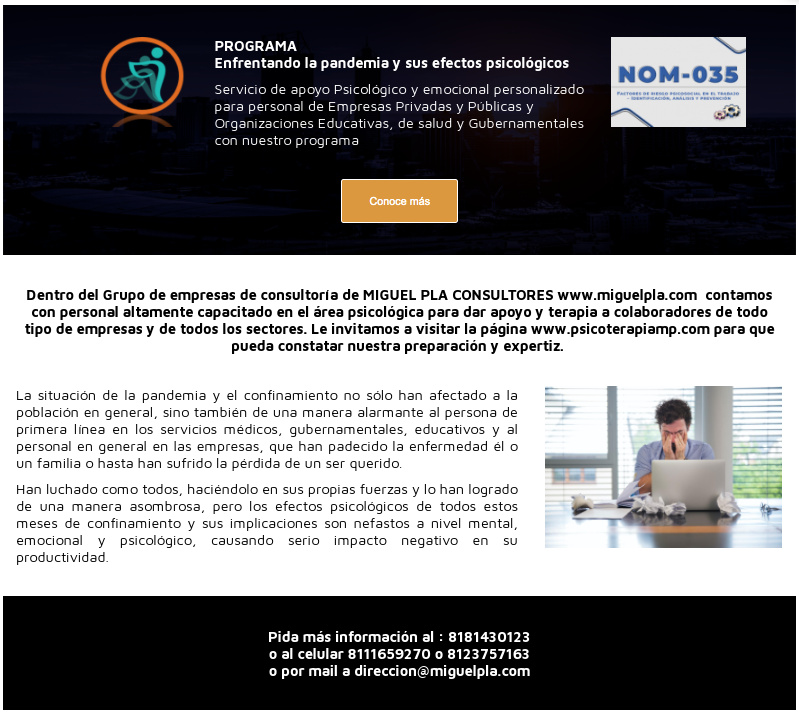The benefits of Global Diversity
Miguel Ángel Pla // Presidente y Director General // direccion@miguelpla.com // Teléfono: (81) 43 00 25
Management and organizational research over the past twenty years can shed light on the key ways in which global diversity can provide competitive advantage.
A recent survey of European business leaders found that four benefits of diversity were most often mentioned there:
+improved team effectiveness and cooperation;
+increased productivity;
+improved customer intimacy; and
+broader access to labor markets.
Global diversity can also have an impact on customer and market penetration. For example, in 2002, Spanish tourism chief Juan José Guemes outlined his plan to emphasize the country’s cultural diversity to compete with cheaper European destinations, using diversity as a clear market differentiator. Americans view the mixing of cultures as synergistic. In May 1999, a Pew poll found that 71 percent of Americans agreed that cultural diversity was a “major reason” for American’s success.
Other benefits of global diversity include:
Creativity and Problem Solving
Proponents of diversity maintain that different opinions provided by culturally diverse groups make for better-quality decisions. As U.S. -based communications firm Bell Atlantic´s CEO Ivan Seidenberg once said, “If everybody in the room is the same, you’ll have a lot fewer arguments and a lot worse answers.”
A laboratory study found that initially culturally homogeneous teams performed better than culturally diverse groups. However, as time passed, the between-group differences began to converge, and after a certain point the heterogeneous teams performed better than the homogeneous ones.
Innovation and Alternatives
Research has shown other business gains of diversity as well: Minority views also stimulate consideration of non obvious alternatives in work setting and are useful for making valuable judgments in novel situations. Heterogeneity in decision-making and problem-solving styles produces better decisions through the operation of a wider range of perspectives and a more thorough critical analysis of issues.
Environmental Scanning and Flexibility
Still others have argued that diversity may be coupled with better environmental scaling and greater flexibility to respond to environmental changes because members of diverse teams are more likely to disagree with each other and find fault with the status quo.
Comprehensive Decision Making
One key variable linking employee diversity with organizational performance is the comprehensiveness of decision making. That is, diversity aids teams in their attempt to be exhaustive or inclusive in considering alternative options or solutions to the task at hand. An empirical study in 1993 found that comprehensiveness makes a greater contribution to firm performance in “relatively fast changing, unpredictable environments.”
Social Cohesion
Paul Collier, chief development economist at the World Bank, advances a thesis that takes the impact of diversity a step further: the diversity in a country inversely correlates with peace and harmony. “In other words, the less diversity, the greater chances of violent social conflict. The more diversity, the more likely that differences will be resolved peacefully.” Examining conflicts over the period 1960 to 1995, Collier found that “heterogeneity strengthens, not weakens, social cohesion.”
Economic Development
Writing in the Singapore Management Review, Paso Raatikainen notes additional business drivers for global diversity, including the ongoing need for skilled labor in countries such as Thailand, where there is a shortage of skilled and unskilled workers because of rapid industrialization. “Without a multicultural and diverse workforce,” says Raatikainen, “economic growth cannot continue. The same is true in Singapore, where about five hundred thousand non-Singaporean and culturally diverse people are doing unskilled word, contributing heavily to the economic development of the nation.
To summarize, global diversity:
+Enhances the quality of problem solving and innovation;
+Enhances productivity;
+Enhances global customer and market penetration;
+Enhances the ability to attract and retain top talent;
+Contributes to social cohesion; and
+Contributes to economic development and growth worldwide.











